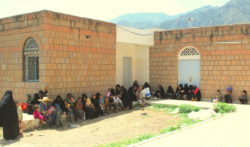
A few nights ago I was able to catch up with two HeartCry co-workers after not seeing them for about three months. As always, hearing their testimonies of how God was at work was very encouraging and challenging. One sister, Elis, has spent most of the last three months caring for her sick brother who just passed away. In order to be at his side during those months, she had to leave her normal place of ministry and stay in the capital and largest city. When I saw her the other night, she was filled with stories from her time there. She was excited about how God had been at work, and thanked the Lord for open doors that she never would have imagined even five years ago. The following is one of the stories – perhaps not the most dramatic, though – of how God used her while she was ministering to her sick brother.
One night some friends came to visit her in order to pray with her dying brother. Providentially, her sister and brother-in-law were both sick that evening so they were not able to go to the local mosque for the evening prayer. In spite of their presence in the house, Elis and her friends were still permitted to pray for her brother as well as fellowship within earshot of her sister and brother-in-law. The next evening, after they were well, the sister and brother-in-law returned to the mosque only to be rebuked by their imam. His scolded them, “Why would you allow Christians to come to your house and pray for you while you’re sick? Why did you not ask Muslims to come?!” Evidently, rumors had already spread in their neighborhood about Christians coming and praying in Elis’ house. Those who started the rumors didn’t realize that they had only prayed for Elis’ dying brother and not her sister and brother-in-law.
This misunderstanding, then, provoked the local imam to visit Elis in order to try and persuade her to come back to Islam. All the people in Elis’ family’s neighborhood know that she’s a Christian, but they had never been told how she had become a follower of Christ. Out of shame, Elis’ parents had said that she became a Christian because she had married a Christian man (which is a bit strange since Elis has never been married). Many, then, in the neighborhood suspected that her marriage was the result of becoming pregnant. That Elis’ parents would start and allow these rumors to persist about their child is insightful. It shows how deep the shame is for these Muslims whenever one of their family members becomes a Christian; it’s less shameful to be thought of as immoral and “forced” to become a Christian rather than as someone who would willingly choose to follow Jesus Christ.
The imam’s tactics to convince Elis to come back to Islam are also insightful. He used manipulation and shame, two enemies of the truth and genuine spirituality. Muslims often use these two weapons to “brow beat” those who have become Christians, or to keep others from considering the claims of Jesus Christ. The manipulation went something like this: “You have become a Christian; don’t you know what that will do to your family? Think about your mother and father who have passed away! They, along with the rest of your family when they die, will be tortured in hell because of the decision you’ve made! How can you be so selfish?!” And the shame: “You are murtad (apostate)! You have done the worst possible sin! You have betrayed your family; you have betrayed your people!”
Elis said that during this conversation, the Holy Spirit enabled her to respond to the manipulation and shame of the imam. She was able to tell him precisely why she had become a follower of Jesus – not because she had been forced to get married to a Christian, being found with child, for she had never been married nor had ever had a child. But, she became a follower of Jesus Christ because God had opened her eyes to see the truth of what the Bible says when it speaks about the finished work of Christ. He is “the way, the truth, and the life” and there is salvation in no one else for there is “no other name under heaven given to men through which we must be saved.” The imam also tried to quote her the hadith (the collection of Mohammad’s sayings and doings). But, she responded, “My mind is empty of what the hadith says [growing up as a Muslim she would have heard countless stories and sermons based on it]. It’s not important; what is important is what the word of God, the Gospel, says.” The imam got very angry and said that he was coming back, next time to bring with him an imam who had studied in Cairo, Egypt, and had already khatam several times (i.e. read the entire Qur’an). Elis welcomed the possibility of another visitor who would give her the chance to speak about her faith in Christ.
Elis did meet with the imam who had studied in Cairo, and the conversation was more of the same manipulating and shaming that she experienced with the other imam. As I listened to Elis tell about both conversations, I saw more clearly the societal consciousness that most Muslims possess. Self-identity is really only important so long as it identifies you with the larger group. And this makes sense in Islam. Embedded within the religion itself is the mistaken belief that social uniformity is accomplished through religious uniformity. To Muslims, Allah is distant; he cannot be known relationally. But, what is very close is your community, filled with people with whom you must live in harmony; therefore, cohesion – personal, social, cultural, and religious – with those who share your “bed, kitchen, and well” is vitally important.
When someone like Elis, then, becomes a follower of Jesus, it rocks the boat of the family and everyone else in the community. To most, it’s shocking and offensive that someone would choose a different path, and they react in various ways. Most react with shame, some with tears, others with anger, violence, and hatred. For various different reasons, many people feel that the social upheavel caused by someone becoming a follower of Christ is unnecessary. But, this is precisely what Jesus said would happen to those who have genuinely experienced the nearness of God in the person of Jesus Christ. When someone truly experiences God through the Gospel and they possess a supernatural faith in the resurrected Savior, social cohesion and acceptance are eclipsed by a new identity in Jesus Christ. Talking to Elis the other night I saw that this was emphatically true in her experience, as it should be for everyone who has counted the cost and anticipates the glory of bearing Christ’s name.
*Pseudonymn

